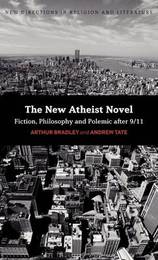
|
The New Atheist Novel: Philosophy, Fiction and Polemic after 9/11
Hardback
Main Details
Description
The New Atheist Novel is the first study of a major new genre of contemporary fiction. It examines how Richard Dawkins's so-called 'New Atheism' movement has caught the imagination of four eminent modern novelists: Ian McEwan, Martin Amis, Salman Rushdie and Philip Pullman. For McEwan and his contemporaries, the contemporary novel represents a new front in the ideological war against religion, religious fundamentalism and, after 9/11, religious terror: the novel apparently stands for everything - freedom, individuality, rationality and even a secular experience of the transcendental - that religion seeks to overthrow. In this book, Bradley and Tate offer a genealogy of the New Atheist Novel: where it comes from, what needs it serves and, most importantly, where it may go in the future. What is it? How does it dramatise the war between belief and non-belief? To what extent does it represent a genuine ideological alternative to the religious imaginary or does it merely repeat it in secularised form? This fascinating study offers an incisive critique of this contemporary testament of literary belief and unbelief.
Author Biography
Arthur Bradley is Senior Lecturer in Literary and Cultural Studies at Lancaster University, UK. He is the author of Negative Theology and Modern French Philosophy; Derrida's Of Grammatology: A Philosophical Guide and (with Andrew Tate) The New Atheist Novel: Fiction, Philosophy and Polemic after 9/11. Andrew Tate is Senior Lecturer in the Department of English and Creative Writing at Lancaster University, UK.
ReviewsA contentious and well-informed appraisal of four major novelists, whose work deals with the central problems of our times, this clearly-written and clear-headed book is an excellent and timely analysis of the fraught intersections between contemporary fiction, religion, politics and thought. It should be read by all those with an interest in contemporary fiction. -- Robert Eaglestone, Professor of Contemporary Literature and Thought, Department of English, Royal Holloway, University of London, UK In comparison to the endless paeans of praise figures such as McEwan, Rushdie and Amis regularly receive, what we have here is an intelligent, critical and highly original re-reading of their work. Probably the most unsettling aspect of this startling book is the suggestion that some of the most central figures in contemporary British literature embody a profound Neo-Conservatism, one which - through its admiration of a rabid 'New Atheism' and a rage against all things Islamic - finds itself in wholesale agreement with the main tenets of the 'War on Terror' . . . I don't think I'll ever read McEwan or Amis quite as innocently again. -- Ian Almond, Professor of Transnational Literatures, Georgia State University, USA A timely and important work examining four of the most lionised novelists with an appropriately aporetic eye. -- Times Higher Education "This reviewer...was not disappointed in the subject, the writing, the research or the outcome of this study." -David Rosman, New York Journal of Books 'Arthur Bradley and Andrew Tate's excellent new book The New Atheist Novel is an important contribution to this counter-movement: counter-new-atheist that is, but without being 'religious' itself.' -- The Glass I congratulate Arthur Bradley and Andrew Tate on this interesting and... beautifully written book. It is a real pleasure when one has so often read books that show so clearly the bias of the author(s) to read a book of such balance and erudition. -- Journal of Contemporary Religion, Vol. 27, No. 1
|